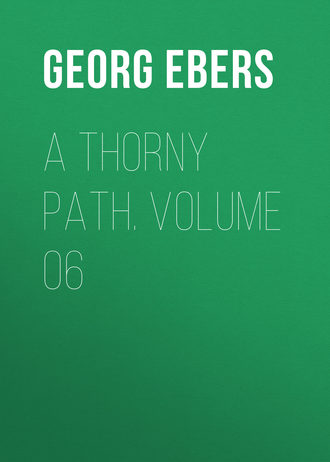
Georg Ebers
A Thorny Path. Volume 06
The lamps were not yet burned out, and, as he looked into her face with surprise, his also brightened, and jumping up quickly he exclaimed:
"All's well; we have you back again, and you have succeeded! Our father-
I see it in your face—and Philip also, are at liberty!"
"Yes, yes, yes," she answered, gladly; "and now we will go together and fetch them ourselves from the harbor."
Alexander raised his eyes and arms to heaven in rapture, and Melissa imitated him; and thus, without words, though with fervent devotion, they with one accord thanked the gods for their merciful ruling.
They then set out together, and Alexander said: "I feel as if nothing but gratitude flowed through all my veins. At any rate, I have learned for the first time what fear is. That evil guest certainly haunts this place. Let us go now. On the way you shall tell me everything."
"Only one moment's patience," she begged, cheerfully, and hurried into the chief priest's rooms. The lady Euryale was still expecting her, and as she kissed her she looked with sincere pleasure into her bright but tearful eyes.
At first she was bent on making Melissa rest; for she would yet require all her strength. But she saw that the girl's wish to go and meet her father was justifiable; she placed her own mantle over her shoulders— for the air was cool before sunrise—and at last accompanied her into the anteroom. Directly the girl had disappeared, she turned to her sister- in-law's slave, who had waited there the whole night by order of his mistress, and desired him to go and report to her what he had learned about Melissa.
The brother and sister met the slave Argutis outside the Serapeum. He had heard at Seleukus's house where his young mistress was staying, and had made friends with the chief priest's servants.
When, late in the evening, he heard that Melissa was still with Caesar, he had become so uneasy that he had waited the whole night through, first on the steps of a staircase, then walking up and down outside the Serapeum. With a light heart he now accompanied the couple as far as the Aspendia quarter of the town, and he then only parted from them in order that he might inform poor old Dido of his good news, and make preparations for the reception of the home-comers.
After that Melissa hurried along, arm in arm with her brother, through the quiet streets.
Youth, to whom the present belongs entirely, only cares to know the bright side of the future; and even Melissa in her joy at being able to restore liberty to her beloved relations, hardly thought at all of the fact that, when this was done and Caesar should send for her again, there would be new dangers to surmount.
Delighted with her grand success, she first told her brother what her experiences had been with the suffering emperor. Then she started on the recollections of her visit to her lover, and when Alexander opened his heart to her and assured her with fiery ardor that he would not rest till he had won the heart of the lovely Christian, Agatha, she gladly allowed him to talk and promised him her assistance. At last they deliberated how the favor of Caesar—who, Melissa assured him, was cruelly misunderstood—was to be won for their father and Philip; and finally they both imagined the surprise of the old man if he should be the first to meet them after being set at liberty.
The way was far, and when they reached the sea, by the Caesareum in the Bruchium, the palatial quarter of the town, the first glimmer of approaching dawn was showing behind the peninsula of Lochias. The sea was rough, and tossed with heavy, oily waves on the Choma that ran out into the sea like a finger, and on the walls of the Timoneum at its point, where Antonius had hidden his disgrace after the battle of Actium.
Alexander stopped by the pillared temple of Poseidon, which stood close on the shore, between the Choma and the theatre, and, looking toward the flat, horseshoe-shaped coast of the opposite island which still lay in darkness, he asked:
"Do you still remember when we went with our mother over to Antirhodos, and how she allowed us to gather shells in the little harbor? If she were alive to-day, what more could we wish for?"
"That the emperor was gone," exclaimed the girl from the depths of her heart; "that Diodoros were well again; that father could use his hands as he used, and that I might stay with him until Diodoros came to fetch me, and then… oh, if only something could happen to the empire that Caesar might go away-far away, to the farthest hyperborean land!"
"That will soon happen now," answered Alexander. "Philostratus says that the Romans will remain at the utmost a week longer."
"So long?" asked Melissa, startled; but Alexander soon pacified her with the assurance that seven days flew speedily by, and when one looked back on them they seemed to shrink into only as many hours.
"But do not," he continued, cheerfully, "look into the future! We will rejoice, for everything is going so well now!"
He stopped here suddenly and gazed anxiously at the sea, which was no longer completely obscured by the vanishing shadows of night. Melissa looked in the direction of his pointing hand, and when he cried with great excitement, "That is no little boat, it is a ship, and a large one, too!" Melissa added, eagerly, "It is already near the Diabathra. It will reach the Alveus Steganus in a moment, and pass the pharos."
"But yonder is the morning star in the heavens, and the fire is still blazing on the tower," interrupted her brother. "Not till it has been extinguished will they open the outside chain. And yet that ship is steering in a northwesterly direction. It certainly comes out of the royal harbor." He then drew his sister on faster, and when, in a few minutes, they reached the harbor gate, he cried out, much relieved:
"Look there! The chain is still across the entrance. I see it clearly."
"And so do I," said Melissa, decidedly; and while her brother knocked at the gate-house of the little harbor, she continued, eagerly:
"No ships dare go out before sunrise, on account of the rocks—Epagathos said so just now—and that one near the pharos—"
But there was no time to put her thoughts into words; for the broad harbor gate was thrown noisily open, and a troop of Roman soldiers streamed out, followed by several Alexandrian men-at-arms. After them came a prisoner loaded with chains, with whom a leading Roman in warrior's dress was conversing. Both were tall and haggard, and when they approached the brother and sister they recognized in them Macrinus the praetorian prefect, while the prisoner was Zminis the informer.
But the Egyptian also noticed the artist and his companion. His eyes sparkled brightly, and with triumphant scorn he pointed out to sea.
The magician Serapion had persuaded the prefect to let the Egyptian go free. Nothing was yet known in the harbor of Zminis's disgrace, and he had been promptly obeyed as usual, when, spurred on by the magician and his old hatred, he gave the order for the galley which carried the sculptor and his son on board to weigh anchor in spite of the early hour.
Heron and Philip, with chains on their feet, were now rowing on the same bench with the worst criminals; and the old artist's two remaining children stood gazing after the ship that carried away their father and brother into the distance. Melissa stood mute, with tearful eyes, while Alexander, quite beside himself, tried to relieve his rage and grief by empty threats.
Soon, however, his sister's remonstrances caused him to restrain himself, and make inquiry as to whether Macrinus, in obedience to the emperor's orders, had sent a State ship after the galley.
This had been done, and comforted, though sadly disappointed, they started on their way home.
The sun in the mean time had risen, and the streets were filling with people.
They met the old sculptor Lysander, who had been a friend of their father's, outside the magnificent pile of buildings of the Caesareum. The old man took a deep interest in Heron's fate; and, when Alexander asked him modestly what he was doing at that early hour, he pointed to the interior of the building, where the statues of the emperors and empresses stood in a wide circle surrounding a large court-yard, and invited them to come in with him. He had not been able to complete his work—a marble statue of Julia Domna, Caracalla's mother—before the arrival of the emperor. It had been placed here yesterday evening. He had come to see how it looked in its new position.
Melissa had often seen the portrait of Julia on coins and in various pictures, but to-day she was far more strongly attracted than she had ever been before to look in the face of the mother of the man who had so powerfully influenced her own existence and that of her people.
The old master had seen Julia many years ago in her own home at Emesa, as the daughter of Bassianus the high-priest of the Sun in that town; and later, after she had become empress, he had been commanded to take her portrait for her husband, Septimus Severus. While Melissa gazed on the countenance of the beautiful statue, the old artist related how Caracalla's mother had in her youth won all hearts by her wealth of intellect, and the extraordinary knowledge which she had easily acquired and continually added to, through intercourse with learned men. They learned from him that his heart had not remained undisturbed by the charms of his royal model, and Melissa became more and more absorbed in her contemplation of this beautiful work of art.
Lysander had represented the imperial widow standing in flowing draperies, which fell to her feet. She held her charming, youthful head bent slightly on one side, and her right hand held aside the veil which covered the back of her head and fell lightly on her shoulders, a little open over the throat. Her face looked out from under it as if she were listening to a fine song or an interesting speech. Her thick, slightly waving hair framed the lovely oval of her face under the veil, and Alexander agreed with his sister when she expressed the wish that she might but once see this rarely beautiful creature. But the sculptor assured them that they would be disappointed, for time had treated her cruelly.
"I have shown her," he continued, "as she charmed me a generation ago. What you see standing before you is the young girl Julia; I was not capable of representing her as matron or mother. The thought of her son would have spoiled everything,"
"He is capable of better emotions," Alexander declared.
"May be," answered the old man—" I do not know them. May your father and brother be restored to you soon!—I must get to work!"







